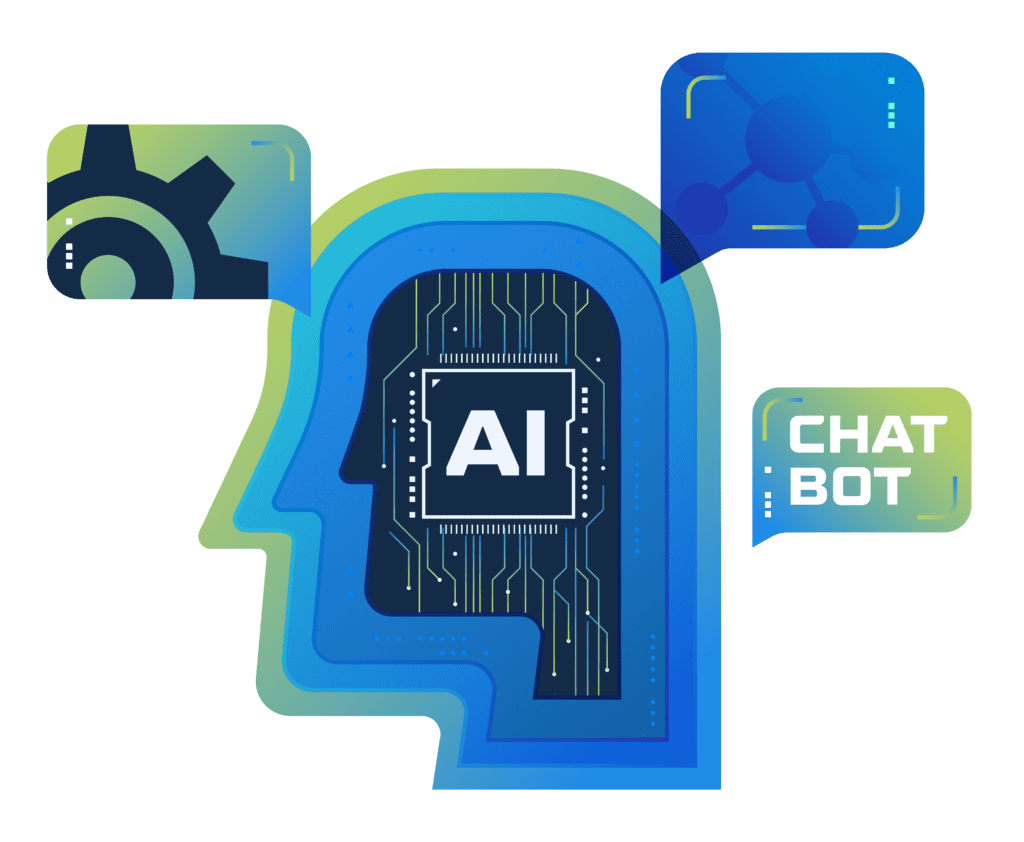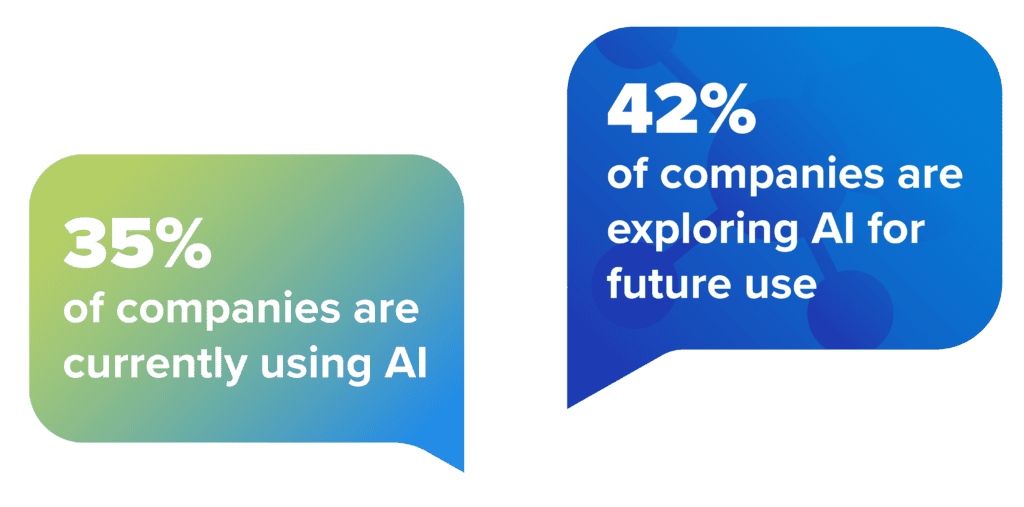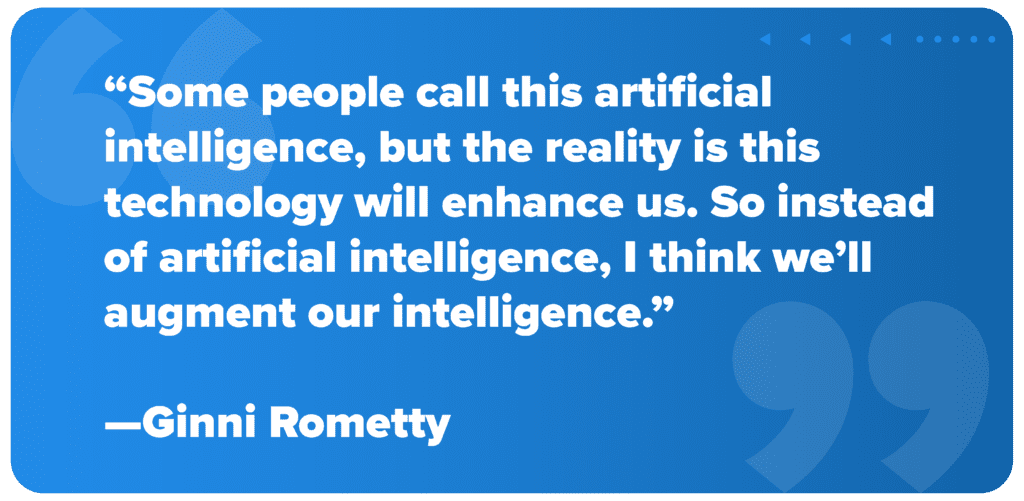
Artificial Intelligence (AI) is making big waves across the business world, and marketing is no exception to its impact, revolutionizing how businesses interact with their customers, analyze data, and make informed decisions.
That said, there’s a lot of hesitation among businesses and marketing professionals when it comes to integrating AI into their practices. In this article, let’s explore why AI marketing is, in fact, a great resource for both organizations and marketing specialists.
What, exactly, is AI marketing?
AI marketing, also known as artificial intelligence marketing, involves the use of algorithms and machine learning to analyze vast amounts of consumer data, predict consumer behavior, and automate marketing tasks.
Some examples of AI marketing include personalized recommendations, chatbots, and predictive analytics. Personalized recommendations use AI algorithms to analyze customer data and provide tailored product or content recommendations based on their preferences and behavior. Chatbots use machine learning to engage with customers and provide support or information, while predictive analytics use AI algorithms to analyze data and identify patterns, allowing businesses to make data-driven marketing decisions in anticipation of customer behavior.
What industries are using AI marketing?
Despite public apprehension, AI marketing is quickly being implemented in industries across the globe. For example, in the e-commerce industry, AI works to personalize customer experiences, recommend products, and optimize pricing strategies. Retail companies can leverage AI marketing to improve inventory management, enhance customer service, and analyze consumer behavior, and financial institutions utilize AI for fraud detection, risk assessment, and portfolio management.

Why are so many companies apprehensive about the idea of AI marketing?
Fear of AI marketing is rooted in two worries: uncertainty, and disruption. Put simply, AI marketing represents a significant shift in how marketing is traditionally done. The notion of using machine learning to make marketing decisions is intimidating for companies that have previously relied on human intuition and experience.
At the same time, AI can revolutionize marketing by increasing efficiency, improving decision-making, and delivering more personalized and impactful experiences for both marketing specialists and their clients. Let’s look at some specific advantages of including AI marketing in your next strategy:
Enhanced Data Analysis: One of the biggest perks of AI marketing is the ability to analyze vast amounts of data quickly and accurately from various sources, such as customer behavior, market trends, and competitor strategies. Specialists can then leverage these results to optimize their marketing campaigns, target specific customer segments, and personalize their messaging.
Improved Customer Experience: By understanding individual preferences, purchase history, and browsing behavior, AI algorithms can custom-tailor marketing offers, which ultimately enhances customer satisfaction, increases engagement, and ultimately improves conversion rates.
Automation for Repetitive Tasks: AI-powered tools can automate repetitive tasks, such as email marketing, social media scheduling, and content creation, which allows marketers to focus on the strategic initiatives and creative aspects of their campaigns.
Predictive Analytics: Every business can benefit from insight into future outcomes and trends. Specialists can use AI algorithms to predict customer behavior, market demand, and performance, which in turn paves the way for proactive decisions.
Competitiveness: In business, staying ahead of the curve is crucial, and that means embracing new technologies that can keep your marketing competitive. By leveraging AI, specialists can gain insights that their competitors may overlook, allowing them to stay ahead in the ever-evolving marketing landscape.
Continuous Improvement: Since AI marketing systems continuously learn and adapt based on new data and feedback, over time, their algorithms become more accurate and effective in delivering results, another way in which businesses can remain relevant.
Real-time Adjustments: When campaigns are constantly monitored and analyzed for performance, marketers can identify underperforming campaigns, adjust targeting parameters, and allocate resources more quickly and effectively.

What about the often-cited cons of AI marketing?
As AI continues to shape the marketing landscape, both the pros and cons of implementation should be discussed, not only for better understanding, but to make informed decisions about how to best utilize AI in the future. Let’s examine some of the most frequently mentioned negatives against AI marketing:
AI marketing relies on algorithms, which raises the risk of bias in decision-making. AI algorithms are trained on historical data, so if that data contains biases or reflects societal prejudices, it’s true that an AI system may inadvertently perpetuate those biases in its decision-making, leading to discriminatory outcomes in areas such as targeting, content recommendation, or pricing. Biases can also be introduced during the algorithm design and data processing stages. That’s why it’s so crucial for companies to actively address potential bias in their AI systems by employing diverse teams, conducting regular audits, and implementing transparency and accountability measures.
AI marketing requires a costly investment in technology and infrastructure. Implementing AI technologies in marketing strategies does involve acquiring and integrating advanced tools, software, and hardware. Additionally, infrastructure is required for the storage, processing, and analysis of large volumes of data that AI marketing relies on, such as high-performance computing systems, cloud storage, and data centers. Businesses must carefully weigh the potential benefits of AI marketing to their operations to determine if the investment is worthwhile.
AI marketing is a threat to privacy and data security. AI technology collects and analyzes vast amounts of data, including personal information and behavioral patterns, and its AI algorithms can be vulnerable to hacking and unauthorized access without the right security in place. Improper use of AI in marketing could also result in the collection and utilization of sensitive personal information without individuals’ consent, which is why it’s essential that companies take the time to implement robust security measures and ethical practices to safeguard data and protect individuals’ privacy.
AI marketing depersonalizes campaigns. In fact, AI marketing can boost the ‘human touch’ by providing insights that create more impactful campaigns, allowing specialists to understand and engage with customers on a deeper level.
How can AI marketing and professionals work together?
From enhanced data analysis and improved customer experiences to efficient automation and predictive analytics, AI can enhance the efficiency and effectiveness of marketing campaigns, while marketing professionals can provide the human touch and expertise that AI lacks. This collaboration can lead to more personalized and impactful marketing strategies that drive better results for businesses.
Need help merging AI into your company marketing plans? Discover how Elevato can help provide a comprehensive solution that gets your organization on the right curve of AI technology — schedule a meeting today.
